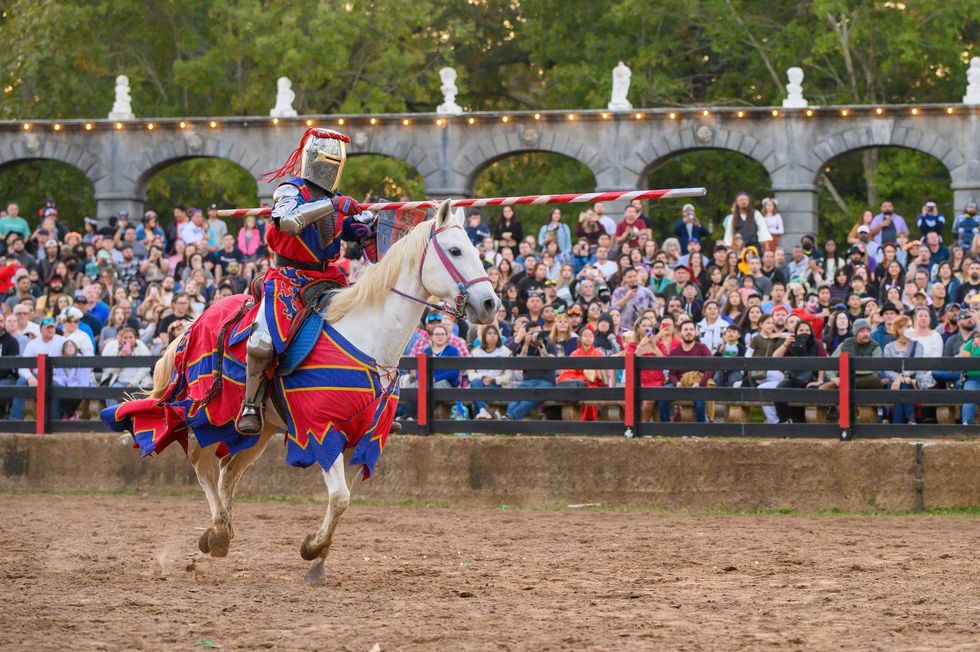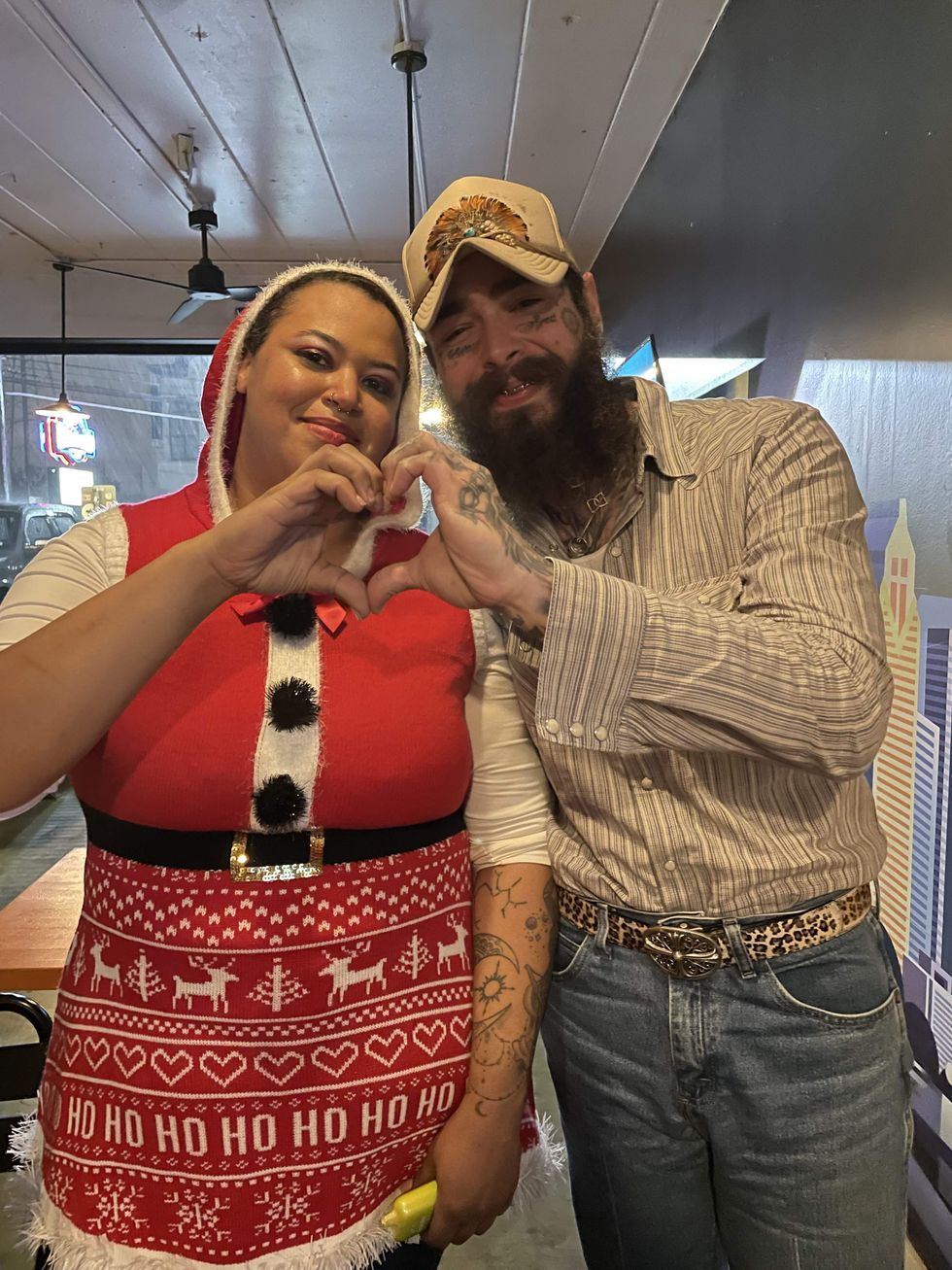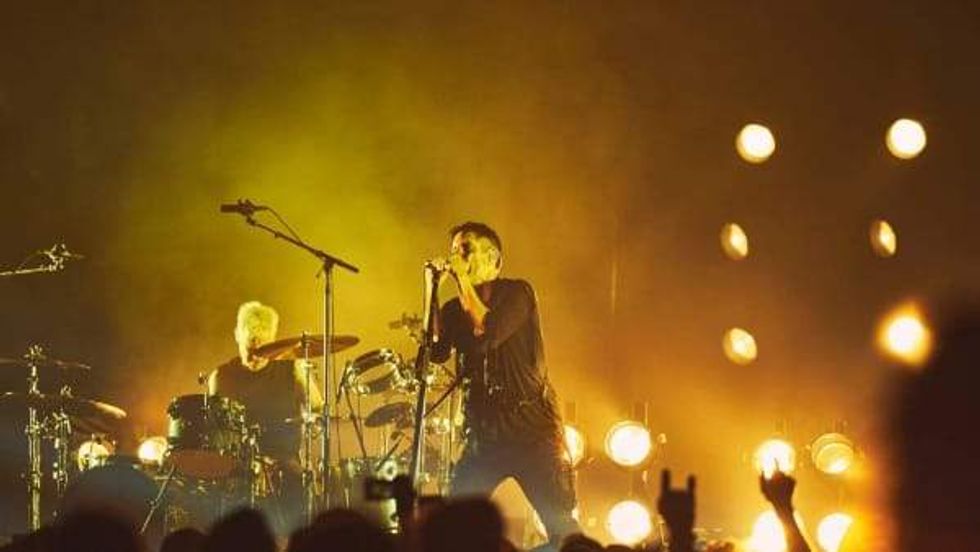Sound Check
Catastrophic's Bluefinger brings to life the man who might have been king ofrock 'n' roll
 Matt Kelly portrays Hermann BroodPhoto by Anthony Rathbun
Matt Kelly portrays Hermann BroodPhoto by Anthony Rathbun Brood's band, Wild Romance, is recreated onstage with Scott Ayers on guitar.Photo by Anthony Rathbun
Brood's band, Wild Romance, is recreated onstage with Scott Ayers on guitar.Photo by Anthony Rathbun The cast of BluefingerPhoto by Anthony Rathbun
The cast of BluefingerPhoto by Anthony Rathbun
Treason is not the only act in which historical potency is determined by the questions of when and where something occurs. Time and place matter even more in determining a legacy (or infamy) when committing suicide.
Such is the tragedy of Herman Brood, the greatest Dutch rock n’ roll star who ever lived, but who today is vitually unknown beyond the borders of the Netherlands.
Had Brood’s punk rock appeal had time to spread through more of Europe and the United States by the time he decided jump off roof of the Amsterdam Hilton Hotel in 2001, his life and death might have been immortalized in pop culture. His name might have been remembered in the same breath with other rock n' roll suicides like bassist Sid Vicious of the Sex Pistols of Nirvana’s Kurt Cobain.
But Brood made one fatal flaw before his leap: He forgot to get universally famous first.
As a result, it’s taken a decade for the off-kilter music and imbalanced life of Brood to reach America. And it is not radio or video that finally delivers him, but the biographical stage work, Bluefinger: The Fall and Rise of Herman Brood that is in a world premiere production from Catastrophic Theatre through Dec. 18 at DiverseWorks.
Bluefinger is a combined effort of Catstrophic Theatre artistic director Jason Nodler and Frank Black, aka Black Francis, the lead singer/guitarist of alt-rock darlings The Pixies, who spontaneously recorded an entire tribute album to Brood in 2007, also called Bluefinger.
On stage, the nearly two-hour show takes shape through a combination of Francis' original songs, interpretations of original works by the protagonist’s former band, Herman Brood & His Wild Romance, and a well-balanced performance of manic artistic imbalance by Matt Kelly as Brood.
Black's artistic care with the life of a musical influence and peer who clearly had little use for it himself is not only the great irony of Bluefinger... it is the tension, almost awkwardness, that drives the production. As Dutch bars, U.S clubs and a litany of drug dens in between are recreated on the Catastrophic stage, one can't help but ask of Brood "Why should we care about someone who cares so little for himself?"
The body of the play focuses on Brood’s emergence from the Dutch municipality of Zwolle (people from this region have long been known as Bluefingers) in the late-'70s as the front man of a rock band that was on the brink of making it big.
Herman Brood & His Wild Romance were imbued with a sound that drew from the art-smart chaos of the Velvet Underground and the jazz café cool of Leonard Cohen. The group started making waves in European clubs with the album, Shpritz (A German word for “syringe”) and songs like, “Dope Sucks,” “Rock & Roll Junkie” and “Saturday Night.” By the summer of 1979, Brood and his band had made it all the way to America touring with The Kinks, Foreigner and The Cars.
The great tragedy of Brood is that had drugs and alcohol not tormented his life, he probably would have been a celebrity in the U.S. as he dreamed. His songs were were reminiscent of the loose Europ-pop favored by other early-80 acts like Falco (remember "Der Kommissar?"). Even more than its staging, the biggest success of Bluefinger offers a showcase for Brood's music.
As the song titles hint at, however, Brood’s fame was built on the back of an ever-growing relationship with speed, heroin and alcohol. Even as Brood was touring the U.S. his manager Koos Van Dijk (played with intensity and comic frusration here by Troy Schulze) was importing high quality drugs for the perfomer in band equipment.
Before long Brood was no longer functional on stage without being high and his great invasion of the United States, in which he was suppose to become the next Mick Jagger or Ray Davies, fizzled into obscurity.
For the Catastrophic stage, the rock n’ roll tragedy of Herman Brood is creatively built with the help of two bands that work together to bring Brood to life. The ensemble of local rockers and female backing vocalists that represent Brood’s Wild Romance band are very much core players (Brood’s Ego, if you will) to the story whose music moves Brood’s vision of greatness forward.
The instrumentation of early 80s rock-meets-techno-meets-cabaret is captured vibrantly and helps to create the time-traveling illusion that some of the more stark, simple sets fail to capture.
The second is the Bluefinger band which focuses on Francis’ original songs about Brood and serve as both an inner-dialogue of Brood’s chaotic mind and a live soundtrack to Brood’s own artistic, physical and mental downward spiral. (Brood's Id). This group is led by Michael Haaga, whose dress, style and mannerisms are based on Black Francis (opening up the possibility that Francis always saw himself eventually taking over that role should Bluefinger have legs beyond Houston).
The final dimension that brings Brood to life is Kelly’s understated and stoic, but desperate representation of the rocker. The Dutch accents by much of this cast is forgivably inconsistent, but Kelly sells both his mannerisms, dialect and dysfunction to near perfection.
Even though we get to see behind the veil of Brood’s drug use and undoing, there are moments when Kelly personifies the look of the smiling Euro-punk whose music and style is at odds with the American pop culture he hopes to personify and eventually help shape.
Kelly re-enancts Brood’s suicide as more of an inevitable final performance than a messy, dramatic exploitation. After all we learn about Brood it seems both appropriate and a bit backwards. For most terminally-troubled artists, suicide is a last, self-serving grab at immortality. For Brood, his death is the catalyst that now erves as an overdue coming-out party.
Through Bluefinger, we get to meet the next great rock n’ roll god of the '70s who instead faded into obscurity because his demons consumed him before he could make good on that promise.



